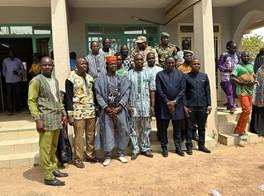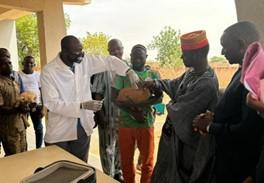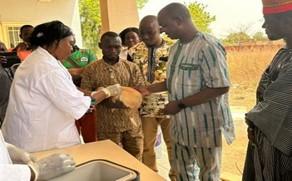After two people died from rabies last year in Sabou, Burkina Faso, regional authorities commissioned a joint investigation into these unusual health events. The investigation was carried out with technical and financial support from the Country Health Information Systems and Data Use (CHISU) program in Burkina Faso. As part of their recommendations, investigators—which included representatives from the Ministry of Health, Ministry of Livestock, and Ministry of Environment—highlighted the importance of improving vaccination coverage against rabies in companion animals in the Center West region.
Human protection from rabies requires adequate immunization of pets such as dogs, cats, and monkeys. But people need to get vaccinated for rabies themselves when they’re bitten by an animal suspected of having rabies (or whose rabies vaccination status isn’t known). That’s why it’s important to raise awareness about the need to be vaccinated against rabies each time a suspicious animal bites someone—and the need to preventively vaccinate animals as well.
To address this need in Burkina Faso, regional authorities organized a preventive vaccination campaign for domestic animals by mobilizing the actors involved in the fight against rabies at the local and provincial levels in a One Health approach to the problem. This included animal breeders, producers, traditional and religious leaders, associations and groups of breeders, and specialists in animal, human, and environmental health. The campaign also aimed to raise awareness about rabies and how to avoid getting it.
One Health: a collaborative, multisectoral, and transdisciplinary approach working at all levels with the goal of achieving optimal health outcomes recognizing the interconnection between people, animals, plants, and their shared environment.
CHISU supports the Government of Burkina Faso in strengthening disease and event surveillance systems according to the One Health approach. This multisectoral approach involves the ministries in charge of health, livestock, and the environment in order to provide an effective response to public health threats. To facilitate the implementation of One Health activities in the country, the government has set up a One Health Executive Secretariat (SE-OH), also with CHISU support.

During the campaign preparatory phase in Sabou, CHISU supported technical working meetings to assess needs and develop a vaccination plan, which included awareness-raising strategies. The launch ceremony, which took place in Sabou in March, brought around 330 people together, including provincial and regional authorities, traditional chiefs, civil society representatives, technicians from the three One Health ministries, agro-pastoral producers, the local population, and technical and financial partners.


Naaba Yemde II of Sabou, Canton Chief and First Customary Noble of Sabou, welcomed and blessed participants at the campaign launch. Other authorities present included the Mayor of Sabou, Koara Abdoul Aziz, the High Commissioner of the province of Boulkiemdé, Sanou Siaka, and CHISU Resident Advisor Dr. Rahim Kebe. The launch was marked by an inaugural vaccination session.
The campaign took more than 10 days and included activities designed to raise awareness about rabies, supervision of immunization professionals, and statistical data reporting. CHISU provided technical and financial support through the supervision and implementation of an immunization data collection framework. This is a tool for recording data on animal vaccines and providing disaggregated data by age, gender, and locality.

During the campaign, immunization professionals alerted the population of the Center West region about the seriousness of rabies and the importance of vaccinating pets in the fight against it. In total, 366 domestic animals were vaccinated—which included 27 domestic monkeys and 339 other pets. Vaccinating the monkeys was just as important as vaccinating other pets (like dogs and cats) for preventing rabies.
“This experience should be duplicated in other regions and provinces of the country for increased rabies prevention in Burkina Faso,” said CHISU Resident Advisor Dr. Rahim Kebe.